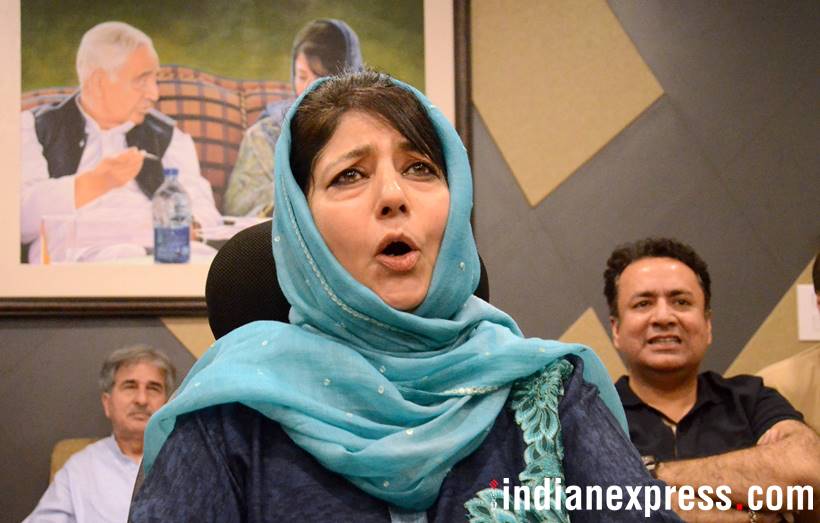 Chief Minister Mehbooba Mufti addressing a media in Srinagar on Tuesday. (Source: Express Photo by Shuaib Masoodi)
Chief Minister Mehbooba Mufti addressing a media in Srinagar on Tuesday. (Source: Express Photo by Shuaib Masoodi)
A day after the BJP snapped ties with the PDP in Jammu-Kashmir and Mehbooba Mufti resigned as Chief Minister, President Ramnath Kovind on Wednesday gave his approval for the imposition of Governor’s rule in the state with immediate effect.
On Tuesday, Governor N N Vohra submitted a report to the Union Home Ministry on the prevailing situation in the Valley and recommended Governor’s rule. Earlier, Governor Vohra asked Mufti to continue in office till alternative arrangements were made. The Governor had also spoken to leaders of the four main parties in J&K but all declined to explore alternative alliances to form the government.
Unlike President’s rule under Article 356, Governor’s rule in Jammu and Kashmir is invoked under Section 92 of the Constitution of Jammu and Kashmir. It will be imposed for six months and gives additional powers to the Governor, including the authority to legislate.
After the expiry of six months, Article 356 will be come into force paving way for President’s rule. And during Governor’s Rule, the Assembly will be under suspended animation. Elections will have to be conducted within six months from whenever the Governor announces the dissolution of Assembly, officials said.
In case elections are not conducted within six months, the Election Commission will have to come out with reasons for not holding polls. In case of Jammu and Kashmir, the security situation could be an important consideration.
National Conference chief Omar Abdullah sought early elections and imposition of Governor’s rule in J&K. After meeting Governor N N Vohra, he said, “I told the Governor that in the 2014 elections, the National Conference did not have the mandate to form a government and today also we don’t have the mandate. We have neither been approached nor have we approached any party for support to form a government in the state. The Governor has no option but to impose Governor’s rule and improve the situation so that a democratic government is formed in the state after holding fresh elections.”
Senior Congress leader Ghulam Nabi Azad also sought imposition of Governor’s rule, saying the situation in J&K is not conducive for elections. He also ruled out any form of alliance with the PDP, directly or indirectly.
“For us, there is no difference between the BJP and the PDP now. That difference was there three-and-a-half years ago… PDP is responsible for bringing the BJP into J&K,” Azad said.
The “only option now is Governor’s rule”, he said, adding that elections can be held in the state a year later along with the general elections.
In a dramatic decision on Tuesday, the BJP ended its three-year partnership with Mufti’s party citing “larger national interest” and “deteriorating security situation”. Putting the blame on the PDP for fall of the alliance, BJP general secretary Ram Madhav said, “continuance in the government had become untenable… responsibility for this kind of scenario lies with the other side”.
The tipping point, the BJP said, was the poor response to the unilateral ceasefire announced before the month of Ramzan. “Ceasefire was an opportunity given to the terrorists and separatists from a position of strength… but this goodwill gesture was not reciprocated,” Ram Madhav said.